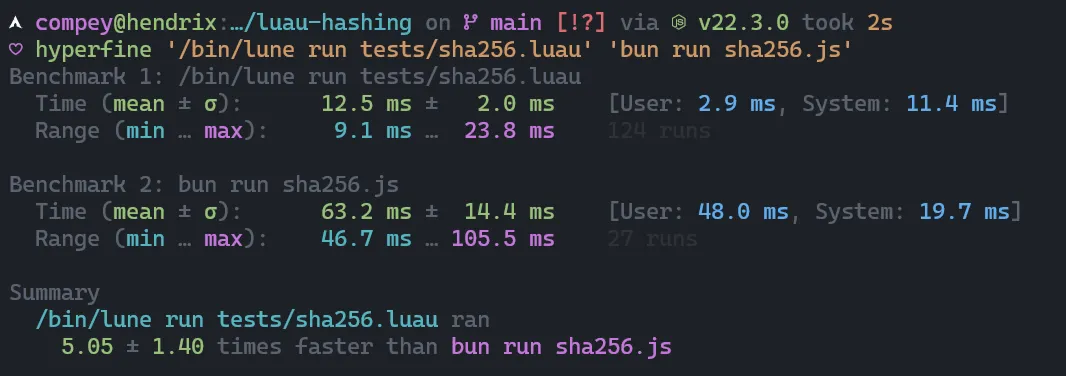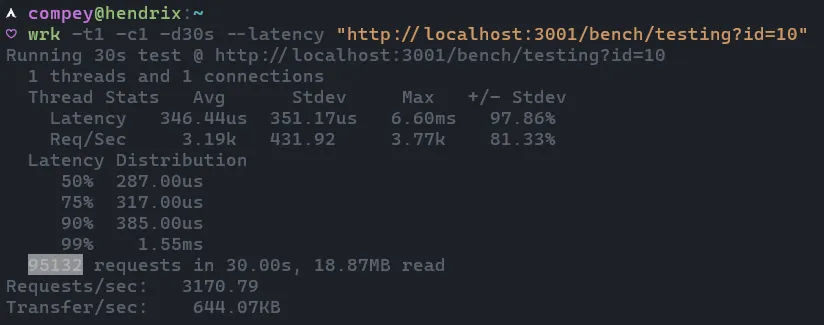Have you ever felt that you live in a loop? That’s how I feel - every time I open tech Twitter (I refuse to call it X). There are several “programming meme” accounts which seem to regurgitate the same few jokes on a regular basis, to the point that I’m convinced that they’re all AI. One of these overused meme formats is related to JavaScript, criticising its poor design choices which lead to various pitfalls a developer can face. I’ve never seen people offer solutions to these, so this blog post attempts to do so by proposing a promising alternative to JavaScript: Luau.
What is Luau?
Luau is a Lua derivative, which is fast, small and gradually typed, as described on their website. Luau was created at Roblox as a scalable alternative to Lua to run millions of times a day, on both clients and servers. It has also been adopted by companies like Yelp for their backend infrastructure. It has generally been pushed aside as a “lego game language”, simply due to its ties to the Roblox platform, as Roblox has generally been tied to inexperienced and young game developers. Luau’s potential as a well-designed scripting language often goes unnoticed. In this blog post, I will attempt to compare Luau with JavaScript and hopefully showcase some of the benefits of Luau.
Luau has significantly diverged from Lua, with many performance improvements (including a separate bytecode format and compiler), type support, standard APIs like buffers, require aliases, and a lot more. Furthermore, Lua generally follows the ideology of “if it can be implemented in pure-lua, it should be, and doesn’t belong within the standard library”, which Luau does not follow much.
Compared to JavaScript, Luau does not face most of its well-documented pitfalls – see wtfjs. This is mainly because Luau inherits a lot of Lua’s good design decisions such as:
- No two different types can be equal
- Type coercion is rare and mostly sane (it usually behaves how you would expect it to)
- Arithmetic and non-arithmetic operators aren’t of the same syntax
- Practically only one data type: the table, which can be used to implement virtually anything
- No semicolons or indents required!
Types
A common flaw in JavaScript is the lack of types, which can prevent many developer mistakes before manual code review. Popular supersets of JavaScript with types include: TypeScript by Microsoft and Flow by Meta.
I will mostly be speaking about TypeScript, since I have more experience with it than the latter. Mainly, there are two glaring problems:
- Types present a learning curve which aren’t present in other statically typed languages.
- Types often overshadow the underlying business logic, since they present a large amount of logic on their own.
Both of these problems aren’t existent in Luau. In Luau, types are simple by design, while also providing sweet autocomplete and strong typechecking - adhering to the Lua philosophy of power through simplicity. Community-made tooling also tries to stick to this philosophy, leading to a strong competition to JavaScript in terms simplicity, which many prefer the language for.
A simple example of this in Luau types is type functions, as opposed to complicated TypeScript type hacks:
// see https://stackoverflow.com/a/73369825
type LengthOfString<
S extends string,
Acc extends 0[] = []
> = S extends `${string}${infer $Rest}`
? LengthOfString<$Rest, [...Acc, 0]>
: Acc["length"];
type IsStringOfLength<S extends string, Length extends number> = LengthOfString<S> extends Length ? S : never
type LocaleCountryCode<T extends string> = IsStringOfLength<T, 2>
function localeFn<T extends string>(code: LocaleCountryCode<T>) {
// Do something
}
localeFn("gb") // This is fine
localeFn("en-gb") // TypeError: Argument of type 'string' is not assignable to parameter of type 'never'
type function IsStringOfLength(s, len)
local lenNum = tonumber(len:value())
assert(s:is("singleton") and typeof(s:value()) == "string", "s must be of type string")
assert(len:is("singleton") and lenNum ~= nil, "len must be of type number")
if #s:value() ~= lenNum then
return error("Expected country code to be 2 characters")
end
return s
end
type LocaleCountryCode<T> = IsStringOfLength<T, "2">
local gb: LocaleCountryCode<"gb"> -- This is fine
local enGb: LocaleCountryCode<"en-gb"> -- TypeError: Expected country code to be 2 characters
The Luau implementation in the form of a type function is not only more readable and intuitive, it also allows for entirely customizable error diagnostics. Such a pattern is common in Luau’s type system design, which emphasizes on types not overshadowing code or requiring a pHD to write due to complexity.
NOTEThe above type example isn’t available in stable Luau yet, and is a part of the experimental type functions RFC. Type functions are run in a sandboxed “type runtime” which exposes a built-in library for type analysis. Here’s an example of what’s possible with this type library:
Consider this TypeScript type:
type ExcludeTypes<T, U> = T extends U ? never : T;In a Luau type function, this can be simplified to a singular function call from the typelib:
type function ExcludeTypes(type: any) return types.negationof(type) end -- Potentially in the future, ExcludeTypes can be simplified entirely to `~T` syntax -- See https://github.com/luau-lang/rfcs/blob/689bba98817224769480ea5594ba352b6694fb4c/docs/negation-types.md
Performance
There’s been a lot of talk about Bun, a fast and modern JavaScript runtime for the serverside. Luau can often outperform Bun. I’m not one to believe in benchmarks, but a naive one would look like this:

For the Luau script, I’m using Lune as the runtime (Lune is similar to what Node accomplishes for JavaScript, it’s a script runtime with a well-designed standard library of APIs and other features) and luau-hashing for the SHA-256 implementation. For Bun, I’m using their native crypto APIs. Lune is 5 times faster than Bun, and the benchmark is rigged against Lune, since we’re comparing a pure Luau implementation to a native zig API.
The Lynx web framework for Lune is 3 times faster than Express on Node.
NOTELuau has made significant performance improvements compared to Lua, as previously discussed. How does Luau make your code go zoooom, though? They have an excellent page on their site discussing the technical details behind the compiler and interpreter which make this possible. I would highly recommend reading this, it’s pretty fun!

Libraries and Ecosystem
Luau has a rapidly evolving community of developers, many of them creating awesome libraries and tools. This section expands on some Luau tooling and library equivalents for JavaScript developers.
Tooling
- Waiting for api.github.com...
- Waiting for api.github.com...
- Waiting for api.github.com...
- Waiting for api.github.com...
- Waiting for api.github.com...
- Waiting for api.github.com...
Libraries
The Luau community has developed many libraries to make JavaScript developers feel at home! These include everything from Promise recreations, to entire ports of popular JavaScript libraries. To make the transition easier, there’s also a set of polyfills for commonly used JS APIs. Following are some libraries to try out in Luau:
- Waiting for api.github.com...
- Waiting for api.github.com...
- Waiting for api.github.com...
- Waiting for api.github.com...
- Waiting for api.github.com...
…and many more which I haven’t listed here!
NOTEIt isn’t currently possible to create websites using react-lua, it is currently only used for frontend in Roblox game development; but web compatibility is being worked on.
Lune
As previously mentioned, Lune is a standalone Luau runtime, similar to Node (or more closely to Deno, since they share similarities). Although Luau is an embeddable language similar to Lua, Lune tries to create a fully-fledged, batteries-included scripting language. Lune provides world-class standard library APIs (referred to as builtins), with a low learning curve. Lune builtins attempt to be obvious, while also being powerful and performant.
Lune has a special focus on async I/O (anything which can be async, should be!) - so that you can leverage the performance of async computation without needing to worry about complex data types like promises. Lune accomplishes this by utilising a custom scheduler powered by Tokio, which handles parallel Luau and I/O API execution. Unlike in regular Lua, spawning async builtin APIs in a coroutine (or a task using the @lune/task builtin) will not block the main thread from executing, allowing for async code to run in parallel.
Lune also includes nice-to-have features, such as a build command supporting cross-compilation to package Lune scripts into executables which can be run without having Lune installed, an interactive REPL, executable scripts, and more to come.
To get started with Lune, check out the docs!
Conclusion
I highly recommend trying out Luau as an alternative to Bash, Python and JS scripts. I have converted many of my scripts to Luau, and it has given me a much nicer developer experience in the long run. Don’t believe me? Take a look at the following scripts I use to package compiled Rust binaries into zip files, both in Luau and Bash:
--> Packages a target-specific Rust binary into a zip file
local process = require("@lune/process")
local serde = require("@lune/serde")
local fs = require("@lune/fs")
type CargoDependencies = { [string]: (number | {}) }
type CargoToml = {
package: {
build: string,
version: string,
name: string,
edition: string,
},
["build-dependencies"]: CargoDependencies,
dependencies: CargoDependencies,
}
local function execute(dir: string, command: string, ...): ()
local args = {...}
print(`--------> {command} {table.concat(args, " ")}`)
local child = process.spawn(command, args, {
shell = true,
stdio = "forward",
cwd = dir
})
print()
if not child.ok then
process.exit(child.code)
end
end
function main(): number
execute(process.cwd, "just", "build", "--release")
local cargoToml: CargoToml = serde.decode("toml", fs.readFile("Cargo.toml"))
local fileExt: ".exe" | "" = if process.os == "windows" then ".exe" else ""
local zipName = `{cargoToml.package.name}-{cargoToml.package.version}-{process.arch}-{process.os}.zip`
local fileName = `fox32asm{fileExt}`
local command = {}
if process.os == "windows" then
command = {
"7z.exe",
"a",
"-tzip",
zipName,
fileName
}
elseif process.os == "linux" then
command = {
"zip",
zipName,
fileName
}
end
execute(
`{process.cwd}/target/release`,
table.unpack(command)
)
return 0
end
return process.exit(main())
# !/usr/bin/env bash
set -euo pipefail
rm -rf staging
rm -rf release.zip
mkdir -p staging
cp "target/{{TARGET_TRIPLE}}/release/{{BIN_NAME}}{{EXT}}" staging/
cd staging
if [ "{{os_family()}}" = "windows" ]; then
7z a ../release.zip *
else
chmod +x {{BIN_NAME}}
zip ../release.zip*
fi
cd "{{CWD}}"
rm -rf staging
Not only is the Lune version cross-platform and much easier to read and write, it is also convenient to use, since the bash script requires the user to manually input information.
If none of the above convinces you to try our Luau, maybe Hina (the Luau mascot, a Hawaiian monk seal) would! 
All I ask you is to try something a little different the next time you start a new side-project, something a little bit more Hawaiian! :)
The name “Luau” is inherited from a Hawaiian word meaning “An elaborate Hawaiian feast featuring traditional foods and entertainment”


